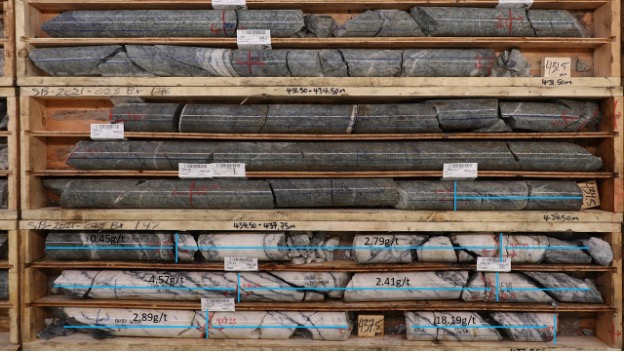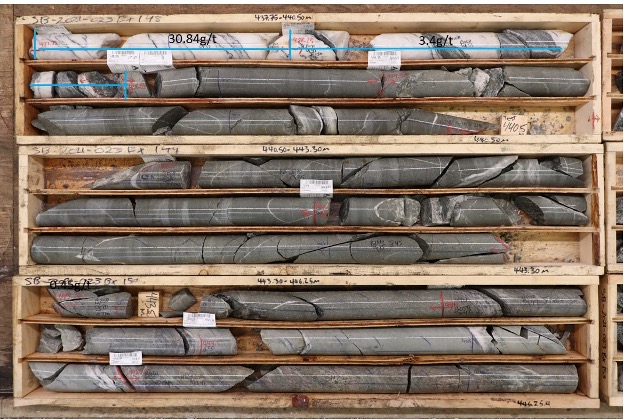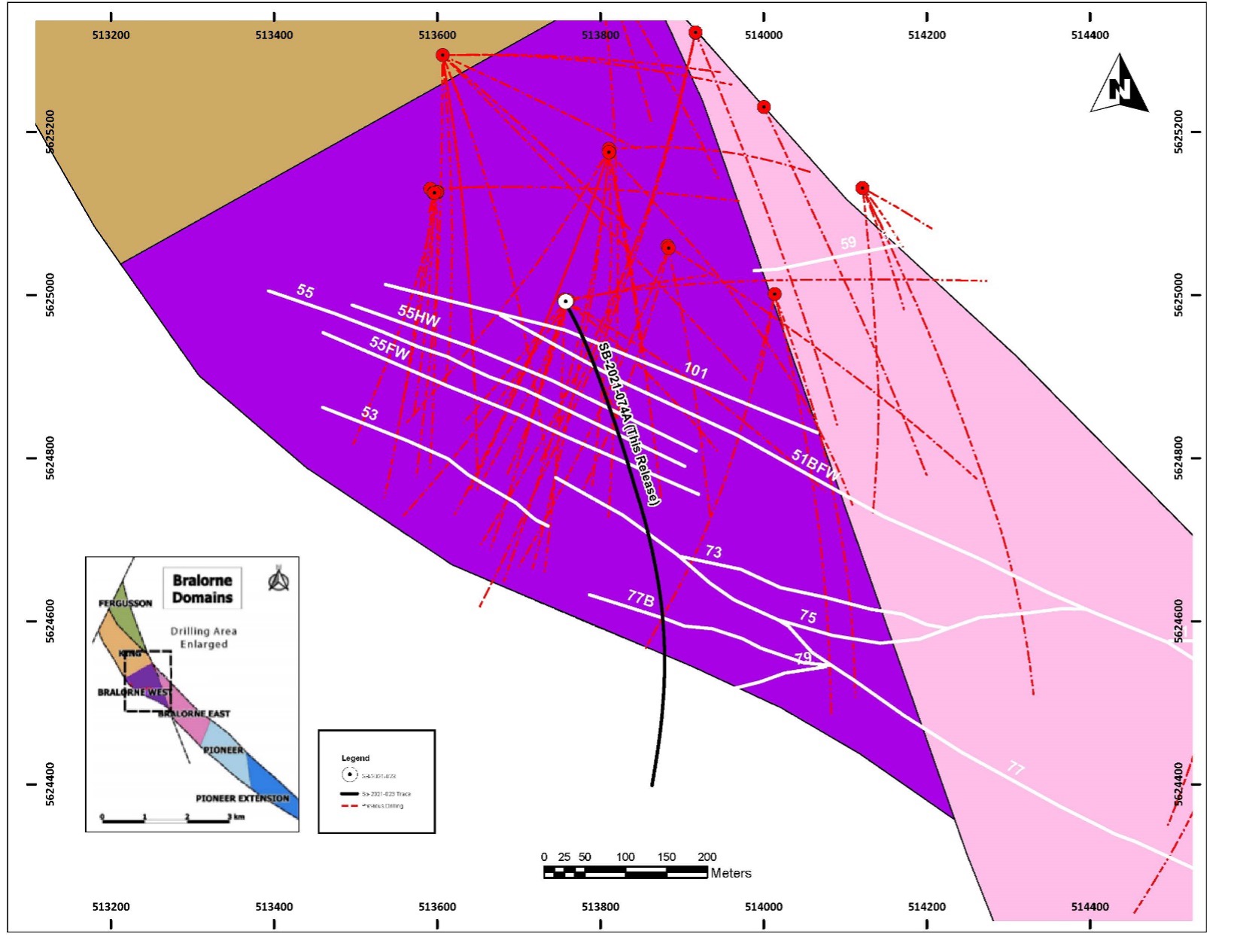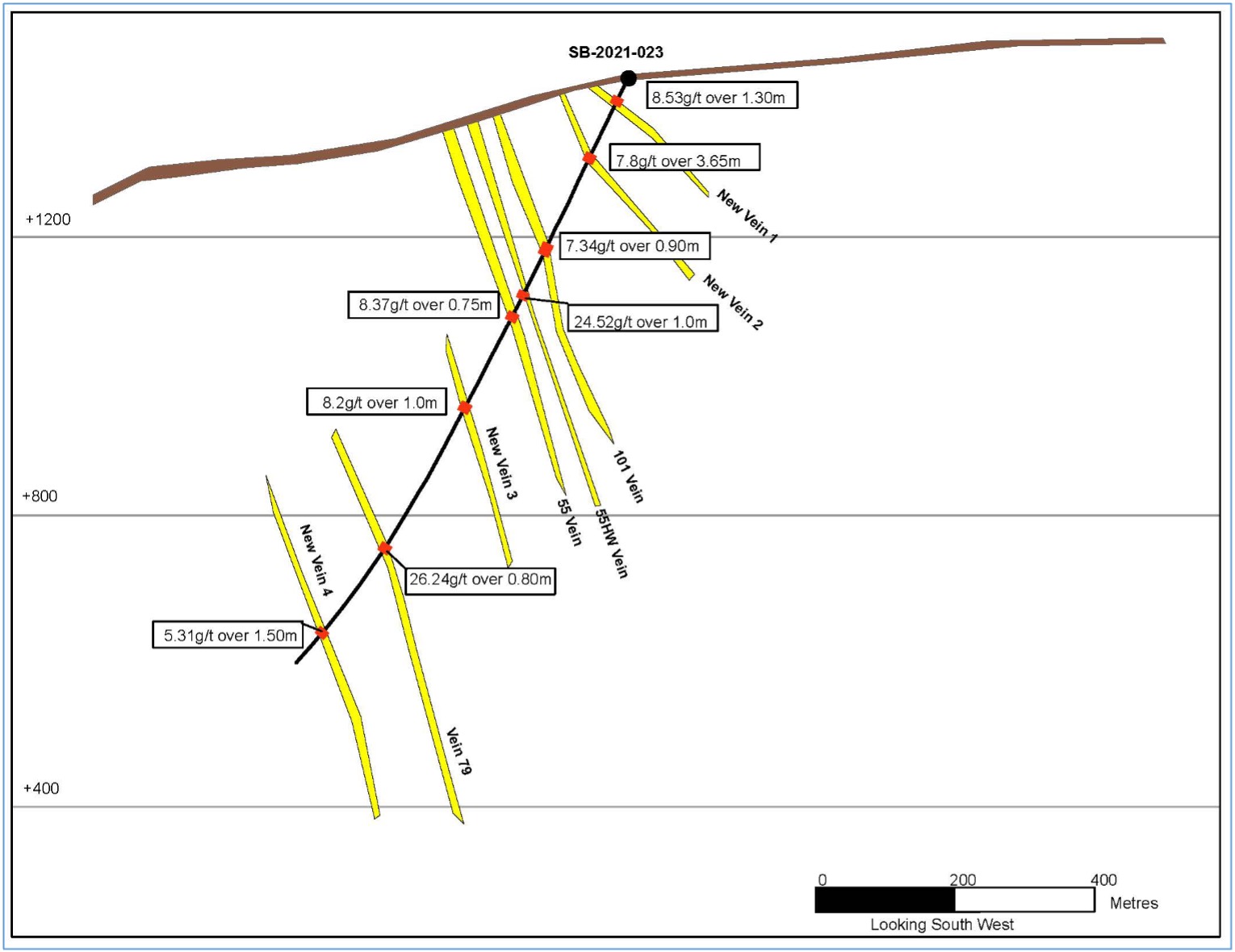TORONTO, ON / ACCESSWIRE / November 2, 2021 / Talisker Resources Ltd. (" Talisker " or the " Company ") (TSX:TSK)(OTCQX:TSKFF ) is pleased to announce high-grade results from drill hole SB-2021-023 highlighted by 24.52 g/t Au over 1.0 metre within 7.51 g/t Au over 4.60 metres at its 100% owned flagship Bralorne Gold Project.
Talisker is concurrently drilling a high-grade narrow vein resource within 700m from surface at Bralorne and a close to surface (<350m) bulk tonnage resource at Pioneer.
Key Points:
- Successful intercept of the 55HW returning 24.52 g/t Au over 1.0m within 7.51 g/t over 4.60m.
- First successful intercept of the 79 Vein returning 26.24g/t Au over 0.80m within 8.91g/t Au over 2.75m.
- Intersected four new veins in hole SB-2021-023 including:
- New Vein 1 - 8.53 g/t over 1.3m within 4.09 g/t over 5.65m
- New Vein 2 - 7.80 g/t over 3.65m within 6.52 g/t over 4.85m
- New Vein 3 - 8.20 g/t over 1.0m
- New Vein 4 - 5.31 g/t over 1.50m
- Successful intercept targeting the 55 Vein returning 8.37 g/t Au over 0.75m within 3.10 g/t over 5.05m.
- Successful intercept of the 101 Vein returning 7.34 g/t Au over 0.90m.
Terry Harbort, President and CEO commented, "The continued discovery of significant, unexploided veins within the Bralorne area coupled with consistent high-grade intersections on historic veins demonstrates the potential for a solid increase to our resource base at the Bralorne Project. The grade continuity within the 55HW and 55 vein re-enforce the confidence in our resource drill-out program with consistent repeated high-grade intercepts."
The 55HW and 55 veins have now been intercepted 28 and 33 times respectively. Highlights of the 55HW include 15.11 g/t over 1.0m (SB-2020-012), 14.66 g/t over 1.5m (SB-2021-020 and 34.58 g/t over 1.5m (SB-2021-058). Highlights of the 55 Vein include 43.64 g/t Au over 1.20m (SB-2020-015), 9.54 g/t Au over 1.90m (SB-2021-017) and 12.75 g/t Au over 0.5m (SB-2021-058). SB-2021-023 increases the intercepts on the 101 vein to 30 highlighted by 37.90 g/t over 0.50m (SB-2021-054).
Five diamond drill rigs are currently drilling at Bralorne. A total of 69,351 metres consisting of 126 holes of a planned and fully funded 100,000 metre drill program have been drilled at the project this year with a total of 92,057m (162 holes) since Talisker initiated drilling at the project in February 2020. Currently 37 holes consisting of 17,250 samples are currently at the assay laboratory and are expected to be received by the Company shortly.
SB-2021-023 Hole Description:
- Complete preliminary results have been received for this hole.
- Located in the Bralorne West block on the NW margin of the granitic intrusive.
- New Vein 1 (43.85-49.50m): Fault affected breccia veining entrained within hydrothermally altered Bralorne diorite. Alteration of increased silica, sericite, and iron carbonate proximal to the C4 fault affected structure. Interval has minor gouge with vein halo arsenopyrite, and pyrite mineralization with mineralization hosted within the vein proximal to contacts.
- New Vein 2 (157-161.85m): Fault affected breccia veining entrained within hydrothermally altered Bralorne diorite. Alteration of increased silica, sericite, and iron carbonate proximal to the C1 fault affected structure. Interval has minor gouge with disseminated arsenopyrite, and pyrite mineralization as well as mineralization hosted within the breccia veining.
- 101 Vein (362.5-363.40m): 101 Vein was intersected at the contact of a fine-grained felsic dyke and Bralorne diorite. Vein halo consists of minor silica, sericite and iron carbonate alteration. Mineralization of disseminated arsenopyrite, and blebby pyrite is hosted within the wall rock with minor vein hosted arsenopyrite.
- 55HW Vein (437.25-438.25m): Vein intersected exhibiting the classic vein textures at Bralorne. Veining is exhibiting extensive crack and seal textures as seen with the fine grained septae. These fine bands are hosting fine grained pyrite and arsenopyrite. Multiple occurrences of visible gold are seen throughout the interval with gold proximal to the crack and seal bands. Vein halo alteration consists of silica and sericite with minor mariposite found proximal to the footwall contact of the vein.
- 55 Vein (477.5-478.25m): Intersect is seen as a weakly banded massive quartz carbonate vein that has a pervasive silica, sericite and mariposite alteration halo. Vein is hosting minor arsenopyrite and pyrite with a vein halo of increased disseminated mineralization consisting of arsenopyrite and pyrite. Intersect is seen with moderate shearing along the contacts as well as within the surrounding wall rock.
- New Vein 3 (638.50-639.50m): Vein was intersected in the Bralorne diorite and is exhibiting crack and seal textures with fine banding proximal to the hanging wall contact. Mineralization is concentrated in the alteration halo hosting minor arsenopyrite, pyrite, pyrrhotite and stibnite. Alteration is consisting of increased silica, sericite, iron carbonate and mariposite.
- 79 Vein (959.55-960.35m): Vein was intersected within the Bralorne diorite exhibiting crack and seal textures with bands of fine-grained sulphides consisting of arsenopyrite, pyrrhotite and pyrite mineralization. Minor vein halo alteration of silica, sericite and iron carbonate.
- New Vein 4 (1135.50-1137m): Untargeted Vein zone that is exhibiting a stockwork of brecciated quartz veining with pervasive alteration of silica, sericite and mariposite alteration within the zone. Veining is undulating and is seen with minor gouge and significant arsenopyrite and pyrite mineralization dominantly localized to the wall rock proximal to veining.
The photos below show SB-2021-023 intersection of the 55HW vein from 434.65m to 438.85m displaying crack and seal textures with fine pyrite and arsenopyrite laminae.


Table 1: Bralorne Gold Project - Drill Hole SB-2021-023 | |||||||
|---|---|---|---|---|---|---|---|
Diamond Drill Hole Name | From (m) | To (m) | Interval (m) | Au (g/t) | Zone | Method Reported | |
SB-2021-023 | 43.85 | 44.35 | 0.5 | 0.32 | New Vein 1 | GO_FAA50V10 | |
SB-2021-023 | 44.35 | 44.95 | 0.6 | 15.79 | GO_FAA50V10 | ||
SB-2021-023 | 44.95 | 45.65 | 0.7 | 2.30 | GO_FAA50V10 | ||
SB-2021-023 | 45.65 | 46.15 | 0.5 | 0.36 | GO_FAA50V10 | ||
SB-2021-023 | 46.15 | 47.1 | 0.95 | 8.71 | GO_FAA50V10 | ||
SB-2021-023 | 47.1 | 48.3 | 1.2 | 2.10 | GO_FAA50V10 | ||
SB-2021-023 | 48.3 | 49 | 0.7 | 1.19 | GO_FAA50V10 | ||
SB-2021-023 | 49 | 49.5 | 0.5 | 0.15 | GO_FAA50V10 | ||
SB-2021-023 | 157 | 157.5 | 0.5 | 0.40 | New Vein 2 | GO_FAA50V10 | |
SB-2021-023 | 157.5 | 158 | 0.5 | 6.71 | GO_FAA50V10 | ||
SB-2021-023 | 158 | 158.5 | 0.5 | 7.25 | GO_FAA50V10 | ||
SB-2021-023 | 158.5 | 159.3 | 0.8 | 11.86 | GO_FAA50V10 | ||
SB-2021-023 | 159.3 | 159.8 | 0.5 | 7.14 | GO_FAA50V10 | ||
SB-2021-023 | 159.8 | 160.5 | 0.7 | 5.62 | GO_FAA50V10 | ||
SB-2021-023 | 160.5 | 161.15 | 0.65 | 6.94 | GO_FAA50V10 | ||
SB-2021-023 | 161.15 | 161.85 | 0.7 | 4.21 | GO_FAA50V10 | ||
SB-2021-023 | 362.5 | 363.4 | 0.9 | 7.34 | 101 | GO_FAA50V10 | |
SB-2021-023 | 363.4 | 364.5 | 1.1 | 0.05 | GO_FAA50V10 | ||
SB-2021-023 | 364.5 | 365 | 0.5 | 1.69 | GO_FAA50V10 | ||
SB-2021-023 | 434.25 | 434.75 | 0.5 | 0.45 | 55HW | GO_FAA50V10 | |
SB-2021-023 | 434.75 | 435.75 | 1 | 2.79 | 55HW | GO_FAA50V10 | |
SB-2021-023 | 435.75 | 436.25 | 0.5 | 4.57 | GO_FAA50V10 | ||
SB-2021-023 | 436.25 | 436.75 | 0.5 | 2.41 | GO_FAA50V10 | ||
SB-2021-023 | 436.75 | 437.25 | 0.5 | 2.89 | GO_FAA50V10 | ||
SB-2021-023 | 437.25 | 437.75 | 0.5 | 18.19 | GO_FAA50V10 | ||
SB-2021-023 | 437.75 | 438.25 | 0.5 | 30.84 | GO_FAA50V10 | ||
SB-2021-023 | 438.25 | 438.85 | 0.6 | 3.44 | GO_FAA50V10 | ||
SB-2021-023 | 477 | 477.5 | 0.5 | 0.20 | 55 Vein | GO_FAA50V10 | |
SB-2021-023 | 477.5 | 478.25 | 0.75 | 8.37 | GO_FAA50V10 | ||
SB-2021-023 | 478.25 | 479 | 0.75 | 1.64 | GO_FAA50V10 | ||
SB-2021-023 | 479 | 479.5 | 0.5 | 4.38 | GO_FAA50V10 | ||
SB-2021-023 | 479.5 | 480 | 0.5 | 3.45 | GO_FAA50V10 | ||
SB-2021-023 | 480 | 480.5 | 0.5 | 1.15 | GO_FAA50V10 | ||
SB-2021-023 | 480.5 | 481 | 0.5 | 1.43 | GO_FAA50V10 | ||
SB-2021-023 | 481 | 481.55 | 0.55 | 1.31 | GO_FAA50V10 | ||
SB-2021-023 | 481.55 | 482.05 | 0.5 | 4.24 | GO_FAA50V10 | ||
SB-2021-023 | 637 | 637.5 | 0.5 | 1.26 | New Vein 3 | GO_FAA50V10 | |
SB-2021-023 | 637.5 | 638 | 0.5 | 2.38 | GO_FAA50V10 | ||
SB-2021-023 | 638 | 638.5 | 0.5 | 1.04 | GO_FAA50V10 | ||
SB-2021-023 | 638.5 | 639 | 0.5 | 4.84 | GO_FAA50V10 | ||
SB-2021-023 | 639 | 639.5 | 0.5 | 11.56 | GO_FAA50V10 | ||
SB-2021-023 | 639.5 | 640 | 0.5 | 2.60 | GO_FAA50V10 | ||
SB-2021-023 | 640 | 641.5 | 1.5 | 0.63 | GO_FAA50V10 | ||
SB-2021-023 | 959.55 | 960.35 | 0.8 | 26.24 | 79 Vein | GO_FAA50V10 | |
SB-2021-023 | 960.35 | 961.5 | 1.15 | 0.62 | GO_FAA50V10 | ||
SB-2021-023 | 961.5 | 962.3 | 0.8 | 3.49 | GO_FAA50V10 | ||
SB-2021-023 | 962.3 | 963.3 | 1 | 1.63 | GO_FAA50V10 | ||
SB-2021-023 | 963.3 | 963.95 | 0.65 | 4.41 | GO_FAA50V10 | ||
SB-2021-023 | 963.95 | 965.3 | 1.35 | 0.71 | GO_FAA50V10 | ||
SB-2021-023 | 1128.5 | 1129.5 | 1 | 0.38 | New Vein 4 | GO_FAA50V10 | |
SB-2021-023 | 1129.5 | 1130 | 0.5 | 2.86 | GO_FAA50V10 | ||
SB-2021-023 | 1130 | 1130.5 | 0.5 | 2.26 | GO_FAA50V10 | ||
SB-2021-023 | 1130.5 | 1131 | 0.5 | 3.70 | GO_FAA50V10 | ||
SB-2021-023 | 1131 | 1131.5 | 0.5 | 1.99 | GO_FAA50V10 | ||
SB-2021-023 | 1131.5 | 1132 | 0.5 | 3.68 | GO_FAA50V10 | ||
SB-2021-023 | 1132 | 1132.5 | 0.5 | 1.43 | GO_FAA50V10 | ||
SB-2021-023 | 1132.5 | 1133 | 0.5 | 0.10 | GO_FAA50V10 | ||
SB-2021-023 | 1133 | 1133.5 | 0.5 | 1.39 | GO_FAA50V10 | ||
SB-2021-023 | 1133.5 | 1134 | 0.5 | 1.99 | GO_FAA50V10 | ||
SB-2021-023 | 1134 | 1134.5 | 0.5 | 6.99 | GO_FAA50V10 | ||
SB-2021-023 | 1134.5 | 1135 | 0.5 | 1.93 | GO_FAA50V10 | ||
SB-2021-023 | 1135 | 1135.5 | 0.5 | 2.92 | GO_FAA50V10 | ||
SB-2021-023 | 1135.5 | 1136 | 0.5 | 5.09 | New Vein 4 | GO_FAA50V10 | |
SB-2021-023 | 1136 | 1136.5 | 0.5 | 3.68 | GO_FAA50V10 | ||
SB-2021-023 | 1136.5 | 1137 | 0.5 | 7.17 | GO_FAA50V10 | ||
SB-2021-023 | 1137 | 1137.5 | 0.5 | 2.42 | GO_FAA50V10 | ||
| Notes: Diamond drill hole SB-2021-023 has collar orientation of Azimuth 155; Dip -63.5. True widths are estimated at 40 - 90% of intercept lengths and are based on oriented core measurements where available. Method Reported includes the most up to date information as of the date of this press release. | |||||||
Talisker is providing an opportunity for shareholders and other interested parties to participate in a Webinar to be held at 4:15 pm ET on Thursday, November 4 th . To register, please click on the following link - https://us02web.zoom.us/webinar/register/WN_BmNwJ57USjKrOuHwF2-2Ig . After registering, you will receive a confirmation email containing information about joining the Webinar.
Qualified Person
The technical information contained in this news release relating to the drill results at the Bralorne Gold Project has been approved by Leonardo de Souza (BSc, AusIMM (CP) Membership 224827), Talisker's Vice President, Exploration and Resource Development, who is a "qualified person" within the meaning of National Instrument 43-101, Standards of Disclosure for Mineral Projects.
About Talisker Resources Ltd.
Talisker ( taliskerresources.com ) is a junior resource company involved in the exploration of gold projects in British Columbia, Canada. Talisker's projects include two advanced-stage projects, the Bralorne Gold Complex and the Ladner Gold Project, both advanced-stage projects with significant exploration potential from historical high-grade producing gold mines, as well as its Spences Bridge Project where the Company holds ~85% of the emerging Spences Bridge Gold Belt and several other early-stage Greenfields projects. With its properties comprising 296,983 hectares over 346 claims, three leases, and 198 crown grant claims, Talisker is a dominant exploration player in south-central British Columbia. The Company is well funded to advance its aggressive systematic exploration program at its projects.
For further information, please contact:
Terry Harbort
President and CEO
Terry.harbort@taliskerresources.com
+1 416 361 2808
Sample Preparation and QAQC
Drill core at the Bralorne project is drilled in HQ to NQ size ranges (63.5mm and 47.6mm respectively). Drill core samples are minimum 50 cm and maximum 160 cm long along the core axis. Samples are focused on an interval of interest such as a vein or zone of mineralization. Shoulder samples bracket the interval of interest such that a total sampled core length of not less than 3m both above and below the interval of interest must be assigned. Sample QAQC measures of unmarked certified reference materials (CRMs), blanks, and duplicates are inserted into the sample sequence and make up 9% of the samples submitted to the lab for holes reported in this release. Sample preparation and analyses is carried out by ALS Global in North Vancouver, British Columbia, Canada and SGS Canada in Burnaby, British Columbia, Canada. Drill core sample preparation includes drying in an oven at a maximum temperature of 60°C, fine crushing of the sample to at least 70% passing less than 2 mm, sample splitting using a riffle splitter, and pulverizing a 250 g split to at least 85% passing 75 microns (ALS code PREP-31 / SGS code PRP89). Gold in diamond drill core is analysed by fire assay and atomic absorption spectroscopy (AAS) of a 50g sample (ALS code Au-AA26 / SGS code GO_FAA50V10), while multi-element chemistry is analysed by 4- Acid digestion of a 0.25 g sample split with detection by inductively coupled plasma mass spectrometer (ICP-MS) for 48 elements (Ag, Al, As, Ba, Be, Bi, Ca, Cd, Ce, Co, Cr, Cs, Cu, Fe, Ga, Ge, Hf, In, K, La, Li, Mg, Mn, Mo, Na, Nb, Ni, P, Pb, Rb, Re, S, Sb, Sc, Se, Sn, Sr, Ta, Te, Th, Ti, Tl, U, V, W, Y, Zn, Zr). Gold assay technique (ALS code Au-AA26 / SGS code FAA50V10) has an upper detection limit of 100 ppm. Any sample that produces an over-limit gold value via the gold assay technique is sent for gravimetric finish (ALS method Au-GRA22 / SGS method GO_FAG50V) which has an upper detection limit of 1,000 ppm Au. Samples where visible gold was observed are sent directly to screen metallics analysis and all samples that fire assay above 1 ppm Au are re-analysed with method (ALS code Au-SCR24 / SGS code - 6 - GO_FAS50M) which employs a 1kg pulp screened to 100 microns with assay of the entire oversize fraction and duplicate 50g assays on the undersize fraction. Where possible all samples initially sent to screen metallics processing will also be re-run through the fire assay with gravimetric finish provided there is enough material left for further processing.
Caution Regarding Forward-Looking Information
Certain statements contained in this press release constitute forward-looking information. These statements relate to future events or future performance. The use of any of the words "could", "intend", "expect", "believe", "will", "projected", "estimated" and similar expressions and statements relating to matters that are not historical facts are intended to identify forward-looking information and are based on Talisker's current belief or assumptions as to the outcome and timing of such future events. Actual future results may differ materially. Those assumptions and factors are based on information currently available to Talisker. Although such statements are based on reasonable assumptions of Talisker's management, there can be no assurance that any conclusions or forecasts will prove to be accurate.
While Talisker considers these statements to be reasonable based on information currently available, they may prove to be incorrect. Forward-looking information involves known and unknown risks, uncertainties and other factors which may cause the actual results, performance or achievements to be materially different from any future results, performance or achievements expressed or implied by the forward-looking information. Such factors include market risks and the demand for securities of the Company, risks inherent in the exploration and development of mineral deposits, including risks relating to changes in project parameters as plans continue to be redefined, risks relating to variations in grade or recovery rates, risks relating to changes in mineral prices and the worldwide demand for and supply of minerals, risks related to increased competition and current global financial conditions and the COVID-19 pandemic, access and supply risks, reliance on key personnel, operational risks, and regulatory risks, including risks relating to the acquisition of the necessary licenses and permits, financing, capitalization and liquidity risks.
The forward-looking information contained in this news release is made as of the date hereof, and Talisker is not obligated to update or revise any forward-looking information, whether as a result of new information, future events or otherwise, except as required by applicable securities laws. Because of the risks, uncertainties and assumptions contained herein, investors should not place undue reliance on forward-looking information. The foregoing statements expressly qualify any forward-looking information contained herein.
Figure 1: SB-2021-023 hole location within the Bralorne West Block.

Figure 2: SB-2021-023 cross section with vein intersections hosted within Diorite.

SOURCE: Talisker Resources Ltd.
View source version on accesswire.com:
https://www.accesswire.com/670686/Talisker-Intercepts-Eight-High-Grade-Gold-Veins-at-Bralorne-Gold-Project-in-Drill-Hole-SB-2021-023






